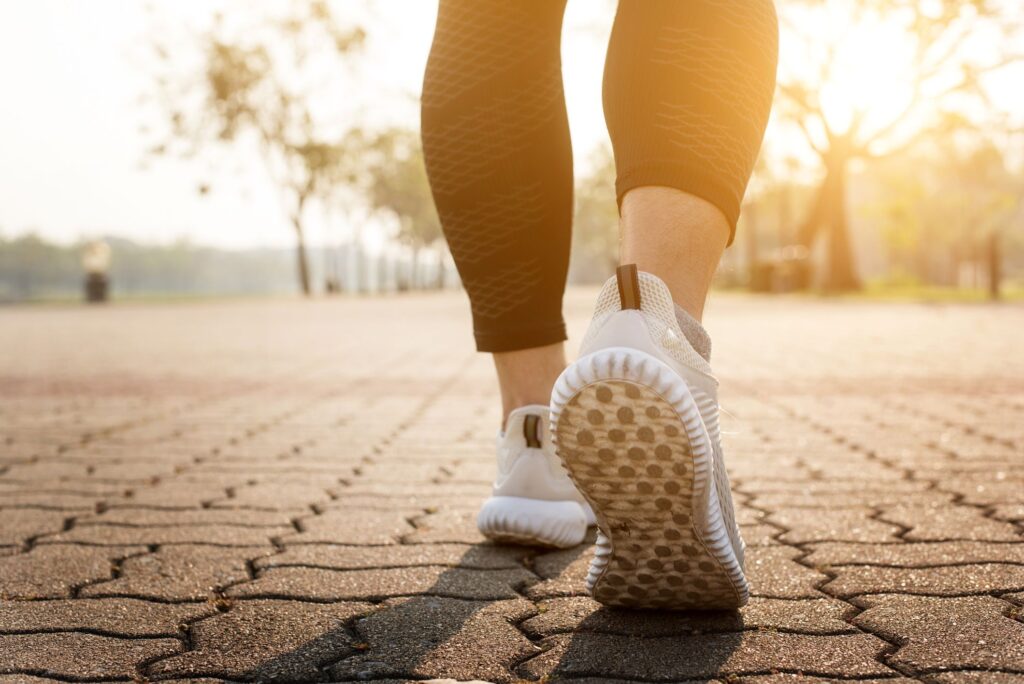Walking on an Empty Stomach vs. After Eating: What’s Best for Weight Loss?

Walking on an Empty Stomach vs. After Eating: What's Best for Weight Loss?
Walking is indeed one of the most effective methods for achieving gradual and sustainable weight loss. In a time where quick fixes and fad diets are prevalent, this simple exercise can yield remarkable benefits for both physical and mental health. Numerous studies have shown that daily walking can transform various aspects of well-being.
Walking 10,000 steps daily can significantly aid in weight loss by helping burn calories and creating a calorie deficit, which could lead to a potential loss of about one pound per week, depending on factors like individual weight and walking pace. However, it’s crucial to pair walking with a balanced diet for the best results.
Different walking styles are becoming increasingly popular to meet various needs. For those on a weight loss journey, morning walks on an empty stomach are preferred to maximize calorie burn. Meanwhile, individuals focused on digestion and managing blood sugar levels often choose to walk after meals. Short walks of 10 to 30 minutes are also gaining traction among busy professionals, as even brief periods of physical activity can significantly improve fitness.
Interestingly, a recent study from the University of Milan highlights the benefits of short ‘micro-walks’ lasting just 10 seconds. The research found that when individuals walked in brief stints of 10 to 30 seconds with breaks in between, they expended more energy and burned more calories compared to walking continuously over the same distance. In fact, some studies suggest that these micro-walks might even be more effective than longer walks. Whether short or long, walking serves as an effective antidote to the increasingly sedentary lifestyles many people lead today.
The NHS advises adults to engage in at least 150 minutes of moderate-intensity activity or 75 minutes of vigorous-intensity activity each week to maintain fitness. Additionally, micro-walks are crucial because shorter walking sessions can lead to higher energy expenditure and increased oxygen consumption over the same distance. Research published in JAMA Neurology and JAMA Internal Medicine indicates that walking for at least 30 minutes, even if not done all at once, is beneficial. For every extra 2,000 steps taken, the risk of heart disease, cancer, and premature death decreases by 10%, with the greatest benefits observed at around 10,000 steps per day, according to the studies.
Taking a walk can be an excellent way to support your mental health. Whether you walk briskly or at a leisurely pace, it can significantly enhance your well-being and help manage mood disorders and depression. Research shows that walking for 75 minutes each day can lower the risk of depression by 18%, and increasing that time to 2.5 hours can raise the reduction to 25%. A study published in JAMA Psychiatry indicates that engaging in 150 minutes of physical activity each week can prevent 1 in 9 cases of depression.
Regardless of the distance, walking is highly recommended for its numerous health benefits. It not only reduces stress but also helps combat various chronic diseases. Additionally, a recent study in the medical journal Atherosclerosis found that climbing five flights of stairs daily, or about 50 steps, can decrease the risk of heart problems by 20%. The study emphasized that regular stair climbing is advantageous for overall health and serves as an effective way for busy professionals to stay fit.
Benefits of Walking on an Empty Stomach
According to some studies, walking on an empty stomach can enhance fat burning because it promotes fat oxidation. When you walk early in the morning, it can also give your metabolism a boost, helping you burn more calories throughout the day. Here are some advantages of morning walks on an empty stomach:
1. Metabolism Boost
Walking first thing in the morning after a good night’s sleep can help jumpstart your metabolism, allowing your body to use nutrients more efficiently and support weight loss. For those on a weight loss journey, walking on an empty stomach can be an effective way to burn fat. According to HHS Author Manuscripts, exercising while fasted may offer metabolic benefits both during and after the activity. Therefore, even a short walk on an empty stomach can significantly enhance your metabolism and help you burn calories throughout the day.
2. Improved Energy Levels
Walking on an empty stomach can also elevate your energy levels for the entire day, providing a strong start. A boosted metabolism contributes to higher energy levels, improving your stamina and efficiency. Walking enhances blood circulation, which helps you feel revitalized. Starting your day with a morning walk can combat feelings of fatigue and tiredness. If you want to maintain your energy throughout the day, consider going for a walk on an empty stomach.
3. Weight Loss
Walking on an empty stomach is particularly effective for those on a weight loss journey. Research indicates that exercising in a fasted state can increase the amount of weight and fat burned, making it a great strategy for weight loss enthusiasts. This implies that walking without eating beforehand can help shed pounds more quickly. According to the International Journal of Obesity, studies have shown that moderate aerobic activities like walking are effective in reducing visceral adipose tissue, commonly referred to as belly fat. Furthermore, engaging in workouts three times a week for a duration of 12 to 16 weeks, combined with 30 to 60 minutes of aerobic activity, has been proven to reduce visceral adipose tissue significantly.
4. Fat Burning
Whether it’s belly fat or any other type of fat, walking on an empty stomach is highly effective. Early morning walks are particularly beneficial for all forms of fat loss, including losing belly fat. A study from Nottingham Trent University found that exercising without eating beforehand can help individuals burn about 70% more fat compared to those who wait two hours after eating to work out. Engaging in any exercise before breakfast can enhance fat oxidation and boost metabolism. Taking your walk outdoors can provide fresh air, which can lift your spirits and lower stress levels. Additionally, getting natural light in the morning can help regulate your circadian rhythm and improve both sleep quality and energy levels throughout the day. To get the most out of this, try to walk at a moderate pace for at least 30 to 45 minutes. Remember to stay hydrated and pay attention to how your body feels, as exercising on an empty stomach may not be ideal for everyone.
5. Vitamin D
Vitamin D is crucial for various bodily and mental functions. A deficiency can lead to mood swings, aches, and other health problems. Walking in the morning on an empty stomach allows you to soak up Vitamin D, which is plentiful in the morning sun. The body naturally synthesizes Vitamin D when exposed to sunlight. The best times for vitamin D absorption are typically from sunrise to around 8 am. In addition to Vitamin D, morning walks on an empty stomach can enhance overall wellness, boost metabolism, improve mood, and promote better sleep quality. You can also get Vitamin D from dietary sources such as fatty fish (like salmon and mackerel), egg yolks, fortified dairy products, and supplements if necessary.
6. Mental Clarity
Taking a walk in the fresh morning air can significantly improve mental clarity and cognitive function. Walking right after waking up is an excellent way to support both mental and physical health.
Post-Meal Walking Benefits
Many studies have highlighted the benefits of walking after meals. Not only does it aid digestion, but it also helps prevent blood sugar spikes. Taking a walk after each meal can help alleviate issues like acid reflux and bloating. Here are some key benefits of a post-meal walk:

Improved Digestion.
Walking after meals can significantly enhance digestion. Instead of sitting or lying down right after eating, which can be harmful to your health and slow down your metabolism, taking a walk is highly beneficial. Research published in PLOS One shows that walking stimulates the stomach and intestines, helping food to pass through the digestive system more quickly.
In addition, a short walk after eating can help manage blood sugar levels and reduce the likelihood of spikes that often follow meals. It’s recommended to walk for at least 10-15 minutes at a gentle pace to fully enjoy these benefits. This simple practice can also boost your mood and energy, contributing to your overall well-being.
Moreover, a study in the Journal of Sports Medicine indicates that a 20-minute walk after meals can significantly lower post-meal blood sugar levels, which aids in better glycemic control. Overall, making a habit of walking after meals can greatly improve digestion and support better health.
Reduces heart disease risk
Walking is a great exercise for your heart as it helps to lower blood pressure, stabilize breathing, and promote relaxation. Regular walking can help prevent many chronic diseases, including heart disease. As an aerobic exercise, walking boosts heart health by increasing your heart rate and improving circulation. A brisk walk lasting 10 to 15 minutes can raise your heart rate to around 110 to 120 beats per minute.
Diabetes control
For individuals with type 2 diabetes or those at risk, walking after meals is especially beneficial. It enhances insulin sensitivity and helps regulate blood sugar levels. Walking after eating can improve digestion, lower blood sugar, and support heart health. According to the Journal of Sports Medicine, exercising for 20 minutes after a meal positively affects post-meal high blood sugar levels.
Acidity
Walking is indeed beneficial for digestion and can help prevent various gut health issues, including bloating and acidity. After eating, a gentle walk can stimulate your digestive system, speeding up the digestion process. This movement encourages the stomach and intestines to contract, which helps push food through the digestive tract more effectively.
The practice of walking after meals is not only supported by modern research but is also recommended in ancient medicinal practices like Ayurveda. It is considered an effective way to promote smooth digestion and can alleviate discomfort associated with acidity. By incorporating post-meal walks into your routine, you can enhance your overall gut health and improve your digestion.
Reduces Bloating
Walking after meals can be particularly helpful for those who experience bloating and discomfort. Just taking at least 100 steps after eating can promote optimal digestion, release gas, and reduce the sensation of heaviness that comes from bloating. Walking at a gentle pace encourages the smooth movement of food through the digestive tract, which can alleviate discomfort.
Both empty stomach walks and post-meal walks offer their own unique benefits. Incorporating both types of walks can help manage blood sugar levels, aid in weight loss, and improve mental health.
Walking also has specific advantages for women. Research from the Harvard School of Public Health indicates that post-menopausal women who walk one to two miles a day can lower their blood pressure by nearly 11 points over 24 weeks. Additionally, women who walk for 30 minutes a day reduce their risk of stroke by 20%, and this risk decreases by 40% if they increase their pace.
For post-meal walks, it’s best to start with a gentle stroll and gradually increase your pace. However, be cautious with brisk walking immediately after eating, as it may lead to stomach cramps or dizziness. A 10 to 15-minute walk can provide numerous benefits for digestion and overall health.












